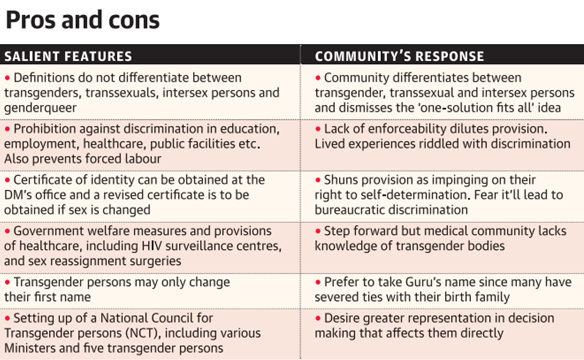Social Justice
The Transgender Persons (Protection of Rights) Bill, 2019
- 27 Nov 2019
- 3 min read
The Parliament passed the Transgender Persons (Protection of Rights) Bill, 2019.
Key Features
- Definition of a transgender person: The Bill defines a transgender person as one whose gender does not match the gender assigned at birth. It includes transmen and trans-women, persons with intersex variations, gender-queers, and persons with socio-cultural identities, such as kinnar and hijra.
- Certificate of identity: A transgender person may make an application to the District Magistrate for a certificate of identity, indicating the gender as ‘transgender’.
- Prohibition against discrimination: The Bill prohibits discrimination against a transgender person, including denial of service or unfair treatment in relation to:
- Education, employment, healthcare.
- Access to or enjoyment of goods, facilities, opportunities available to the public.
- Right to movement, right to reside, rent, or otherwise occupy property.
- Opportunity to hold public or private office.
- Access to a government or private establishment in whose care or custody a transgender person is.
- Health care
- The Bill also seeks to provide rights of health facilities to transgender persons including separate HIV surveillance centres, and sex reassignment surgeries.
- It also states that the government shall review medical curriculum to address health issues of transgender persons, and provide comprehensive medical insurance schemes for them.
- It calls for establishing a National Council for Transgender persons (NCT).
- Punishment: It states that the offences against transgender persons will attract imprisonment between six months and two years, in addition to a fine.
Concerns
- The Bill does not have any provision for self-determination of gender. The transgender community has questioned the certificate of identity.
- It fails to address the lack of an effective mechanism to enforce the legal prohibition against discrimination on the ground of gender identity.
- It does not make provision for affirmative action in employment or education despite the Supreme Court’s mandate in National Legal Services Authority NALSA v. Union of India (UOI) case (2014).
- The Bill sets out lighter sentences for several criminal offences, such as “sexual abuse" and “physical abuse", when they are committed against transgender people.





